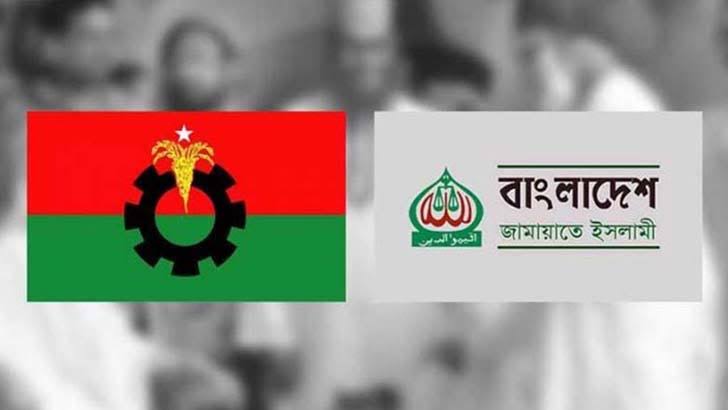Following years of strained relations, BNP and Bangladesh Jamaat-e-Islami are leaning towards bolstering their strategic ties, intending to spearhead a more assertive anti-government campaign, according to leaders from both parties.
However, they said they would continue to maintain a cautious public distance between them to preempt potential criticism, counter negative campaigning by the ruling party, and avert misunderstandings with some alliance partners and the international community who have reservations about Jamaat.
For quite some time, there has been a noticeable gap between the BNP and its long-time ally Jamaat, especially since the BNP dissolved the 20-party alliance to carry out a simultaneous movement with many other parties, including some left-leaning ones.
However, some BNP leaders said this week they are making efforts to bridge the gap and unite both right and left-leaning parties to take to the streets with fresh vigour against the government.
BNP Secretary General Mirza Fakhrul Islam Alamgir recently articulated his party’s position on the Islamist party, stating that while he does not endorse Jamaat-e-Islami’s politics, he acknowledges its strategic approach as highly methodical, akin to that of the Communist Party.
Awami League General Secretary Obaidul Quader criticised Fakhrul’s statement, asserting that it further solidifies BNP’s perceived connections with the anti-independence Jamaat and communal evil forces.
Later, Jamaat issued a statement protesting Quader’s comments, yet notably remained silent regarding Fakhrul’s remark indicating a lack of support for Jamaat’s politics.
On 27 May, Jamaat sent seasonal fruits, including mangoes and lychees, as gifts to BNP chief Khaleda Zia and its acting chairman Tarique Rahman, signifying a potential renewal of ties with BNP.
The BNP and Jamaat came close to each other’s during the 1991 national election, but their formal coalition was established in 1999. Since then, they have been together in their political journey. Starting with a four-party alliance and expanding to a 20-party coalition, they remained politically aligned until the dissolution of the 20-party alliance before the 12th national elections.
A member of the BNP standing committee, wishing anonymity, acknowledged that their party’s relationship with Jamaat-e-Islami has been stressed due to differing regional and international political calculations.
He said they came out of the alliance with the Islamist party before the last national election aiming to secure India’s trust and support for a credible election in Bangladesh.
“We deliberately kept our distance from Jamaat before the election. That’s why Jamaat did not directly participate in our simultaneous movement. But we did not achieve our goals by distancing ourselves from Jamaat. Therefore, we now believe that all right and left-leaning opposition parties should unite in an anti-government movement to achieve the desired success,” the BNP leader said.
He mentioned that they are currently maintaining a strategic relationship with Jamaat based on mutual understanding to avoid unnecessary controversy. “We are in contact with Jamaat, and we hope that Jamaat will tactically join the simultaneous movement in the days ahead,” he added.
Another BNP standing committee member said their party is maintaining a cautious relationship, balancing strategic interests amid political complexities. “Our communication with Jamaat may increase, but it will not be as deep as before.”
However, he said some BNP leaders advocate for strengthening ties with Jamaat, arguing that maintaining distance from the Islamist party is a flawed strategy, especially when the government is pursuing aggressive and repressive policies against the opposition.
“There’s also reservation among some of our policymakers about Jamaat”, said the leader.
Talking to UNB, a senior Jamaat leader said they are keen to foster a close relationship with BNP through mutual understanding, particularly amidst Bangladesh’s political landscape shaped by Awami League’s pro-India stance.
He, however, said BNP has long been demonstrating a perplexing stance towards Jamaat. “Initially, we independently observed certain programmes of the simultaneous movement. We distanced ourselves when we perceived reluctance from BNP,” he added.
After failing to garner sympathy from India during the last general election, the Jamaat leader noted that BNP has taken steps to enhance its relationship with their party.
“Our ties with BNP have improved to some extent, but I don’t think deep trust has developed,” he said.
Contacted, BNP vice-chairman Shamsuzzaman Dudu said both BNP and Jamaat share identical demands for elections under a neutral caretaker government, which forms the basis of their relationship.
“If Awami League also accepts our demands for democracy restoration and fair elections under a neutral government, we see no issue in establishing a relationship with them,” he said.
He also said BNP maintains relationships with various left and right-wing parties to promote this shared objective.
Asked about whether BNP is forging a strategic relationship with Jamaat, he pointed out the Islamist party’s past support for Awami League’s movement for a caretaker government in 1994 and drew a parallel to BNP’s current alignment with it.
“The relationship that Awami League had with Jamaat during the movement, we have the same relationship with Jamaat now. If the Awami League had a strategic relationship, we also have now a strategic relationship with Jamaat”, he said.
Jamaat-e-Islami Secretary General Mia Golam Parwar said their party is no longer part of the BNP’s alliance since the dissolution of the 20-party platform. “But we maintain a courteous relationship with BNP. We have also relations with other opposition parties.”
He said they want to keep relations with all the democratic opposition parties that share goals such as removing the current regime, restoring democracy, people’s lost voting rights and ensuring a credible national election under a non-party caretaker government.”
Asked whether they discussed with BNP about political issues and programmes, Parwar said, they have informal conversations and communication with BNP. “We talk to BNP leaders about politics”
Responding to another question, he said whether Jamaat-e-Islami will join simultaneous movements with BNP in the future depends on political developments and the demand of politics in the field.
themirrorasia


.jpg)